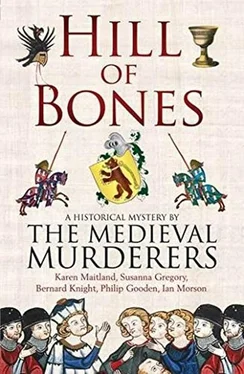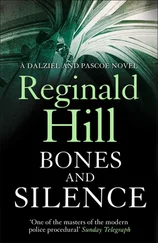‘Others may be.’
‘Yes,’ said William.
‘If they’re going to search on this Solsbury Hill of yours they’re going to do it soon. To strike while the iron is hot.’
‘Yes, they are,’ said William.
‘I have an idea,’ I said.
‘Are you sure this is such a good idea?’ said Laurence Savage.
‘Nick knows what he’s doing,’ said Abel Glaze, ‘even if the rest of us haven’t the faintest notion.’
I looked towards William Hawkins for support but he stayed silent. The scheme that the two of us contrived the previous night in the Vicarage Lane house, while fortified with generous doses of his father’s aqua vitae, did not seem so plausible in the cold light of day. The literal cold light, since we were sheltering behind some low bushes near the top of Solsbury Hill. Away from the fuggy air of the city, the breeze blew sharp and clear, and the morning sun was scarcely beginning to warm the slope we sat on. Bath is ringed with hills – they say there are seven of them, just as in Rome – and this Solsbury one is located to the north-east of the city. It is a hill much like any other, distinguished only by an unnatural flatness on top and the even slant of its sides. William Hawkins said that it might have been used in the old times as some kind of fort.
We had struck out from the town that morning, the four of us, Laurence having established that we weren’t required at the Bear Inn to prepare for our final night’s performance. I’d explained to my friends that we were set to catch some villains who had attacked my new friend, William, and his cousin, Kate. Laurence and Abel might have taken this as a tall story but they’d seen with their own eyes the young woman in the inn yard, together with a male companion. Furthermore they knew I’d been engaged on nocturnal adventures, since I returned to Mother Treadwell’s very late the previous night, or rather in the small hours of the morning. They thought I’d been up to you-know-what again and I didn’t bother to disabuse them of the notion.
I outlined the situation: the attack in the street, the reason for it; the fact that the villains had stolen a map – or plan, or guide – call it what you will – which they hoped would reveal the whereabouts of some hidden items; relics buried not far from the city of Bath. Hawkins said that he thought his father’s sketch, the one we’d looked at in the Raven tavern, showed the south-western flank of the hill, the one facing the city. Like his cousin, he was of the opinion that Christopher’s crosses and arrows most likely indicated the place where King Arthur had personally vanquished his Saxon enemies, all nine hundred of them. But to a more greedy eye the markings might appear to show the burial places of treasure. We were assuming that whoever was in quest of treasure would waste no time. After stealing Christopher’s book, they would want to make use of it straight away.
Abel and Laurence were happy enough to join in the adventure. To be honest, I think they were growing a little tired of our stay in Bath. I’ve noticed this before on our summer tours. You spend a couple of days in a place and then you get restless, looking towards the next destination, wondering what pastimes and delights will be offered by the town over the horizon. Abel and Laurence hadn’t experienced the excitements of the city of Bath as I had, and the prospect of smoking out a malefactor or two – with the very remote possibility that buried treasure and King Arthur could be involved – was sufficient to bring them along.
We left by the North Gate, and passed through an area of wooden houses and hovels that grew more ragged the further we shifted from the walls of the city. We went from lanes to paths to rough tracks, passing orchards and small farmsteads and neat fields, some with sheep grazing. We moved at a slight upward incline until we reached the flank of the hill after the better part of an hour.
There were few people about and no one at all that we could see on the hillside. By now, Laurence and Abel were openly sceptical about the entire enterprise. Faced with a steepish hillside they talked openly about turning round and going back to Bath. To get them to go on, I had to promise that all the drinks would be put on my slate when we reached Bristol.
‘Every day, mind, Nick,’ said Laurence. I nodded.
So we clambered up the slope and were rewarded at the top with a fine view of the country in every direction. Down below in a loop of the river was the city of Bath, neatly girdled by its walls and lapped by pastures and woods. From here you could hardly recall the odour of its close, stinky air, nor see the mean habitations clinging to its skirts. I breathed deep and looked about with pleasure. I wondered whether this was truly the place where a mighty battle had been fought by King Arthur, whether it was the field where the Saxon enemy had been vanquished. I thought of the little image of the bear in Christopher’s book. Had bears wandered across this place during those far-off days? Who knew?
Now it was as quiet and peaceful as the day of creation. The only living creatures were small and unassuming. Larks sang high in the air. Rabbits scuttered across the grass. I thought how these rolling hills meant more to me than the others, with the exception of William, since they were not so far from the Somerset village of my birth. William spent some time looking about, like me, pleased to be home again.
We’d brought some ale and bread and cheese with us. We established ourselves behind a line of bushes that gave some protection from the breeze and through which we could see the west-facing approaches to the hill. We chatted and drank and ate. William talked about Edinburgh, another city of hills, as he described it. He talked about his work as secretary to a cloth manufacturer. He had been present when King James set out from Edinburgh on his long, meandering progress to London to claim the throne. James had promised to return to the Scots capital every three years but he had not done so yet. I told the others the story I’d spun to the Bath watchmen about my familiarity with the King.
We talked about plays and players in the way – half proud, half mocking – that you talk with your fellows about your own work. Then we fell silent and thought about the wisdom of sitting hundreds of feet up a hillside waiting for the arrival of treasure-hunters, and wondered who was really engaged on a wild-goose chase here. The sun was high in the sky by now and the ale was making me sleepy. Pretty soon we’d have to give this up for the fruitless enterprise it was and return to the town to prepare for our final evening’s performance.
It was Abel who spotted them first. He jabbed me as I lay at a slant on the grass, squinting at the sun. I sat up and peered through the leaves. In the distance, beginning their ascent, were two figures. Out for a stroll? But who strolls anywhere except a gentleman in a city street or a lady in her garden? These two were about some business. One of them, wearing a labourer’s clothes, was carrying a mattock and spade over his shoulder. The other, better dressed, carried no implements and walked some way to the rear, either because he found the slope of the hill very effortful or to disassociate himself from his companion. In the further distance was a carriage, with a driver left behind to mind it and the two horses. He had been able to steer part of the way along one of the tracks leading towards Solsbury Hill but it was pleasing that the occupants of the carriage were compelled to get out to complete their journey and tire themselves out in the process.
I was glad that we were right, William and I. Glad as well to recognise two people I knew, enemies not friends. The fat man in the rear was John Maltravers, the merchant and corporation member, and hater of plays and players. The one who wanted us whipped as vagrants. The fellow in front, stocky rather than fat, was the wretch who accosted me in the King’s Bath and most likely attacked the Hawkins cousins in the street. William was peering through the shrubbery beside me. He knew Maltravers, of course. He was able to identify the other man, the one with the spade and mattock.
Читать дальше












